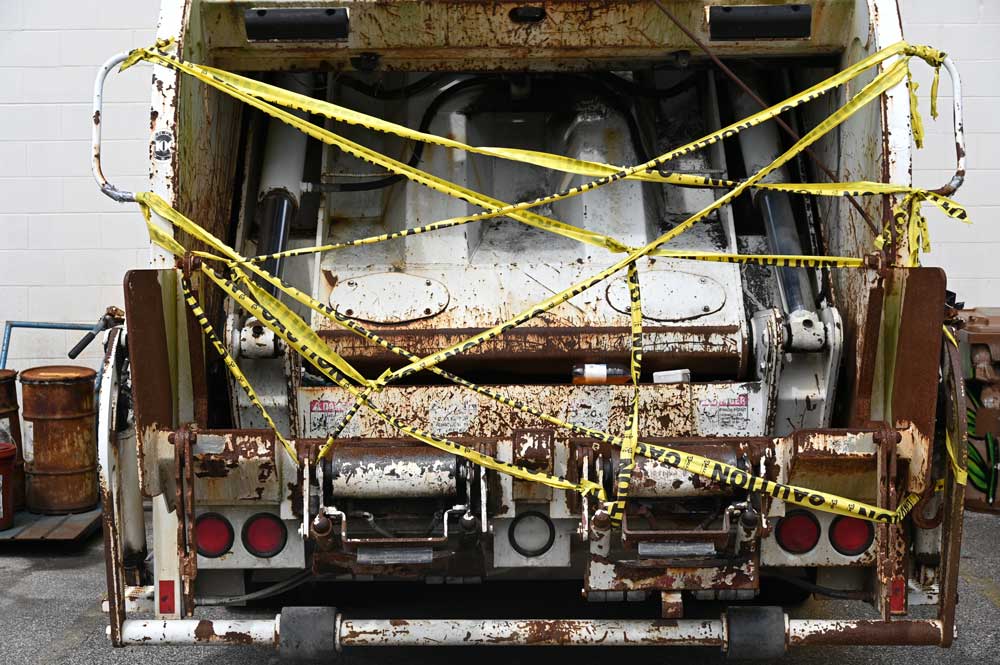
The Flagler Beach City Commission Thursday evening voted to delay a series of increases to water, sewer, garbage and stormwater until Oct. 27–not because they were uncomfortable with the increases, but because they felt the increases may not be enough. So the rates to be proposed in two weeks will likely be higher than those before them on Thursday.
City Manager William Whitson had proposed the increases to reflect a combination of inflationary pressure and required investments in building a new sewer plant. He had tapered them, knowing that in some cases the increases would not be sufficient to cover all required costs. The tapering was necessary to avoid more of a shock for residents.
“In my experience as a city manager, I’ve found that it’s better to go up on rates a little bit as you go along, as opposed to a large increase all at once,” Whitson told commissioners. “That’s my advice to you. But it is ultimately your decision. And we’ll be happy to implement however you want.
The commission was leery of approving increases knowing that in two cases–garbage rates and water and sewer rates–the increases would still leave an operational deficit.
Water and sewer base rates were to increase 1.72 percent. Garbage rates were to increase 7 percent. The stormwater fee for a residential home was to increase 42 percent, or $4 a month, to $13.50. The sum total for a typical home in the city was to add up to a $6.58 a month increase, or $79 a year, not including actual waterflow charges.
The commission had all but approved rate increases during budget workshops last summer, but not specific numbers. City Commissioner Deborah Phillips, asking the city manager to explain the increases as proposed, said “we’re going to have a lot of unhappy residents that yet again, their bill is going up.”
“We felt for them. I pay the same rates myself. I live in the city,” Whitson said. “What we tried to do was a trade off. We knew that certain costs had to go up, for example, the stormwater fee, you heard about it going up 42 percent. Well, that was because of the large capital costs associated with that particular fund, plus the regulatory requirements we now have to comply with from the EPA and the DEP,” the federal Environmental Protection Agency and the state Department of Environmental Protection. “That’s what made that cost go up. Wherever we could economize, tighten our belt, hold the line, that’s why we came up with a 1.72.” The recommended increase, he said, had been higher, and may well be higher in coming years. “We’re doing the best we can to stretch that out and not let that impact hit everybody all at once.”
Commissioner Eric Cooley was opposed to the approach. “We can do this process anytime throughout the year, it doesn’t have to be done right now,” he said. The rates, he said, are not being raised enough to pay for the system anyway, and a rate study has not been completed to specify what rates are necessary. The increases, he said, are ill-timed. “We can do this when the rate study comes back,” he said. “It’s a lot easier if you’re going to change rates for bills, and we feel for people when you can say, this is exactly what the money is going towards. We can’t do that right now.”
Same problem with garbage fees, which he said still won’t be high enough to prevent the city from dipping into reserves, for $100,000, to make ends meet. He then spoke sharp words pointed directly at Whitson: “I don’t think that’s intelligent. I don’t think that’s a good way to run the city,” Cooley said. “We’re going to be running water and sewer in the red. We’re going to be running sanitation in the red, and we’re doing that to maybe trying to ease the pain of doing a big increase in stormwater, which won’t be running in the red. But all of that is without data. It’s all off assumptions. We get the data, and then we make intelligent decisions based off that. That’s just my opinion. And we wait, if we don’t do this right now.”
Whitson did not disagree. But he said the process he was handed when he took over management of the city a year and a half ago created the current timeline. And waiting for a rate study would delay the entire process longer, costing the city.
“If you want to wait until the rate study comes in, you certainly can do that. But the sticker shock will be higher,” Whitson said. “You can wait till next year or you can do it all. It’s totally up to this commission.”
Commissioner Jane Mealy relied on her experience to shed doubt on the benefits of waiting. “It’s always going to be different. this is my 17th rate increase,” she said. “Some bad, some not so bad. But I don’t think that rate study is going to be rock solid either because we don’t know the supply chain issues. We don’t know labor costs. It will be an estimate the same way everything else is.”
Three major elements are influencing rates: debt service, operating costs and capital. “All three of them are moving right now,” Whitson said, with interest rates rapidly increasing. Even with a rate study in hand, Mealy said, considering today’s unpredictable economic climate, “by tomorrow, we could be totally off, right? But you can’t do that and say this is going to match up exactly. It’s not going to.” But she agreed with Cooley: she did not like running two of the funds in deficit. But not approving the rate increases would widen those deficits.
Commissioners asked for more calculations, at least to know what the rates would be to get funds out of deficit. Whitson said he would work on it–repeating that, during the budget process, the commission had already agreed in principle to the approach he was proposing.
The results of those calculations will be submitted to the commission for approval at the Oct. 27 meeting. Residents should expect a bit more of a shock than the numbers presented on Thursday.
Rhonda Allen, the city’s interim finance director, had presented the item with an overview of the city’s utilities budget, which takes account of growth from The Gardens development on John Anderson Highway and new developments on Roberts Road. Those developments will pay impact fees on water and sewer, defraying the cost of additional capital needs, and generate additional user-fee revenue.
But with additional service comes the nee for additional staff, city officials say. While reading meters has become more efficient, freeing up staff time, City Manager William Whitson said, the city’s failing and “collapsing” infrastructure requires additional staffing. The city has had several water main breaks recently, requiring repairs. “It gets so expensive to do that,” Whitson said. “So labor intensive to do that. So the older infrastructure makes our labor costs go up, because there’s more effort involved in contractors support or staff support to get it corrected and fixed.
That’s partly why the higher fees are needed. Generating more money for infrastructure maintenance and rebuilding is the other big reason.
![]()





























Duncan says
Tough spot and neither perspective is wrong. Since increase are coming, seem they should start now with a mild increase with the expectation of a larger increase in 2023.
Blaming the EPA and DEP is nonsense; every municipality has regulations to contend with; that is nothing new. I would hate to see the state of affairs if it were not for EPA and DEP regulations.
Jimbo99 says
When are the impact fees of the era of new construction & growth going to pay for any of this ?
Steve Vanne says
Save that $11300 your going waste on that sport complex study. They will raise the rates no doubt.
Denali says
Lord I wish you people could keep the local units of government straight. That $113.000 (mot $11300) is being spent by Palm Coast, not Flagler Beach. Just like the old Sheriff’s building is a county issue and the jerks who got the big raises are in Palm coast. One has nothing to do with the other.
Dennis C Rathsam says
The Fagler Beach commision, needs to speak with the Palm Coast councilmen…. Here in Palm Coast we got a great deal on garbage pick up…..